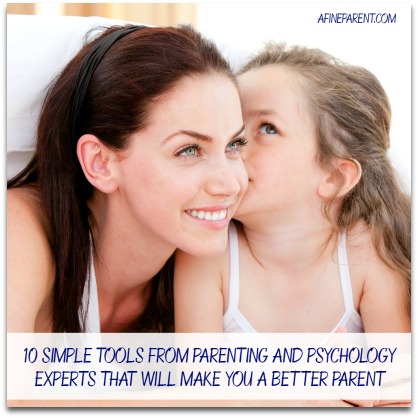 Why does parenting have to be so complicated!?!
Why does parenting have to be so complicated!?!
There are so many things to know! And not just know, but to be an expert on. During my almost 12 years of parenting, I feel like I have had to become an executive assistant, strategic planner, dietician, psychologist, nurse, and wizard. (If only that last one came with a wand!)
And I’m constantly searching the Internet for ways I can be a more effective parent. That’s why I go looking for simple and easy tools. I don’t have time for complicated and hard!
I was helping Sumitha summarize the “deep dive” talks for her FREE online Positive Parenting Conference and I found myself jotting down note after note about the simplest things I can do to help get through my most complicated parenting issues.
Like handling school stress. Just last night my oldest called me into his room at bedtime and let out all his anxiety and anger about these Basic Skills Tests that he and his class have been taking for the last 9 days. It turns out that he’s so anxious his feelings are leaking into his relationships with his friends and coming out as anger.
Because of all these amazing experts I was able listen to him and then help him to express his anxiety and reframe these tiffs and hard words with his friends into something not quite so scary. (You’ll read more about all that below!)
I’ve put together a list of these simple tools from 10 amazing experts that helped me with the parenting issues I feel most at-sea about. I know they will help you, too!
#1 Getting Kids to Cooperate
I am so tired of fighting with my kids to get them to do every little thing – from putting their dirty laundry in the hamper to shutting off the iPad. Why can’t they just cooperate with me! Susan Stiffleman’s talk, How to get Your Kids to Cooperate, gave me incredible insights into why more yelling isn’t the answer.
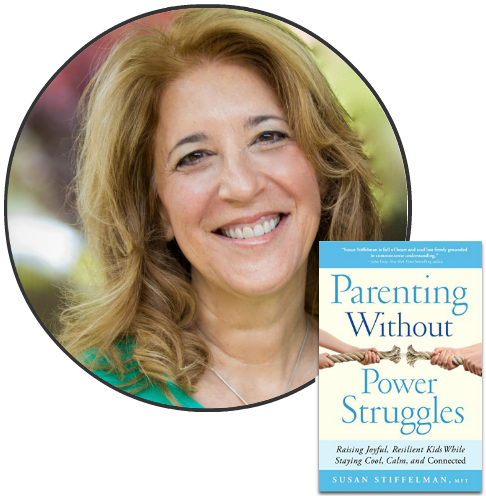 For 30 years, Susan has been helping families as a marriage and family therapist and psychotherapist. Her website, www.SusanStiffelman.com will plug you into tons of parenting resources including digital summits and parenting coaching. In fact, she is a Parent Coach for Huffington Post! She has touched hundreds of thousands of parents through her book Parenting without Power Struggles: Raising Joyful, Resilient Kids while staying Cool, Calm, and Connected. Through Susan’s gentle guidance, parents from all over the world have found solutions that provide drama-free mornings, homework sessions, and important discussions.
For 30 years, Susan has been helping families as a marriage and family therapist and psychotherapist. Her website, www.SusanStiffelman.com will plug you into tons of parenting resources including digital summits and parenting coaching. In fact, she is a Parent Coach for Huffington Post! She has touched hundreds of thousands of parents through her book Parenting without Power Struggles: Raising Joyful, Resilient Kids while staying Cool, Calm, and Connected. Through Susan’s gentle guidance, parents from all over the world have found solutions that provide drama-free mornings, homework sessions, and important discussions.
Susan’s key to cooperation isn’t how much control we have over our kids, it’s about how much connection we have with our kids….
“[When we’re trying to get kids to cooperate] we think that the solution is to just be bossy or more controlling, but that stems from a place of… powerlessness. And our children do not respond to that…. They’re not supposed to respond to your controlling ways. They may behave better short-term, but there is a cost to that.”
“When you try to control them, [your kids] they may cooperate. They may pick up the wet towel off the bathroom floor. They may eat the food that you are insisting that they eat. But it comes at a cost of disconnection from you because there isn’t an honoring of who they are and what their needs might be […].”
#2 Discipline Without Stress, Yelling or Shaming
I have used Time Outs for years. To me it was gentler form of punishment and behavior correction, but I get frustrated because it doesn’t always work. Ariadne Brill’s talk How to Use a “Time In” Instead of the Traditional “Time Out” (and Why) has opened my eyes on why parental connection is so much more effective.
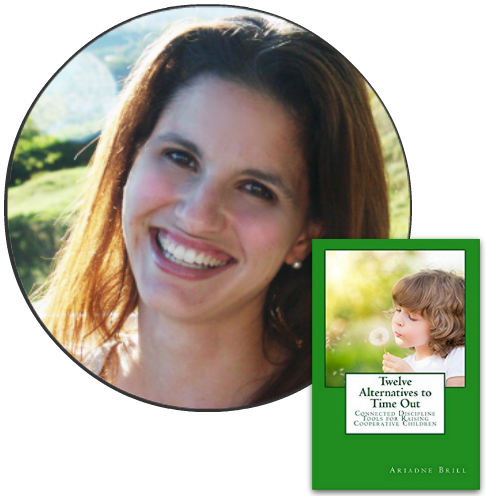 Ariadne is a positive discipline expert who has been helping parents find the confidence they need to parent positively. Her website, www.PositiveParentingConnection.net, is a cooperative parenting blog and tool shed. She is one of a few contributing experts who write about positive discipline and family communication. Her book Twelve Alternatives to Time Out: Connected Discipline Tools for Raising Cooperative Children, can guide you through the tricky spots at every stage of your child’s life.
Ariadne is a positive discipline expert who has been helping parents find the confidence they need to parent positively. Her website, www.PositiveParentingConnection.net, is a cooperative parenting blog and tool shed. She is one of a few contributing experts who write about positive discipline and family communication. Her book Twelve Alternatives to Time Out: Connected Discipline Tools for Raising Cooperative Children, can guide you through the tricky spots at every stage of your child’s life.
Ariadne is a passionate proponent of positive discipline. Here are some of her thoughts on why a “Time In” is so much better than a “Time Out”:
“The problem with Time Out is that children end up living that moment as a disconnection from their parents. So while it’s not punitive on a physical level, on a relational level the child really struggles with the idea of being isolated or sent away.”
“Time in is really just taking the original idea of Time Out and transforms it into something that puts the focus on the relationship between the parent and the child. Because we now know that for children to behave well, they need to feel well, and they need to feel a sense of trust and feel like their parent is there to help them. And so, Time In really is just taking that idea of a pause… and we’re going to help the child calm down and reflect.”
#3 Raising Resilient Kids
During my time in Switzerland, I had my eyes opened to whole new ways of parenting my kids. Given that Denmark is consistently listed as THE happiest country in the world, I was excited to watch Jessica Joelle Alexander’s talk, How to Raise Resilient Kids Using the Danish Way of Parenting. She gave me whole new insights on parenting choices that would help my kids grow into happy people and naturally develop resilience!
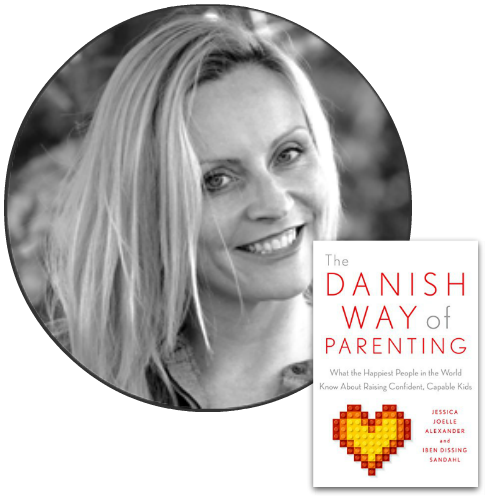 Jessica is native of the US who married a Dane and then had unbelievable adventures traveling the world. When she had kids, she started noticing how every culture had their own way of parenting, and she was surprised to find the Danish way of parenting deeply resonated with her. In her book, The Danish Way of Parenting: What the Happiest People in the World Know About Raising Confident, Capable Kids, she explains why their method of parenting has propelled Denmark into the top spot of the Happiness Index for over 40 years! Her website, www.JessicaJoelleAlexander.com, is an enchanting window into how the European parenting lifestyle can work for us.
Jessica is native of the US who married a Dane and then had unbelievable adventures traveling the world. When she had kids, she started noticing how every culture had their own way of parenting, and she was surprised to find the Danish way of parenting deeply resonated with her. In her book, The Danish Way of Parenting: What the Happiest People in the World Know About Raising Confident, Capable Kids, she explains why their method of parenting has propelled Denmark into the top spot of the Happiness Index for over 40 years! Her website, www.JessicaJoelleAlexander.com, is an enchanting window into how the European parenting lifestyle can work for us.
Why are Danes so darn happy? Jessica tells us a couple secrets:
“Happy children grow up to be happy people who become happy parents and it becomes a cycle.”
“They [Danes] have this ability to see a situation and instead of making it negative or using black and white language – which sometimes we have a tendency to do – they find a more nuanced, slightly more positive, yet completely realistic, detail. And it’s a skill. It’s a skill they teach their children.”
#4 Handling School Stress
My oldest boy gets so stressed out about school and his relationships with his friends. It makes him angry and irritable and stops him from falling asleep. You can see why I could not wait to dive into Lori Lite’s talk School Stress: How to Cope with it Calmly and Effectively.
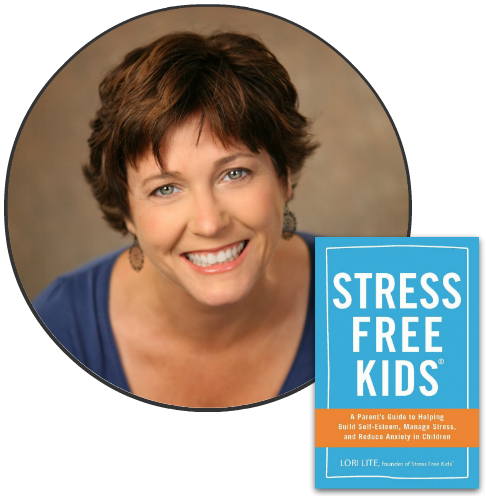 If Lori looks a little familiar to you it’s not just because she has one of those wonderful faces that makes you feel right at home. Her book Angry Octopus was featured on Shark Tank back in season 1! Lori has also developed the award-winning line of relaxation CDs, Indigo Dreams, and her book Stress Free Kids: A Parent’s Guide to Helping Build Self-Esteem, Manage Stress, and Reduce Anxiety in Children has been teaching parents how to help their kids with the ever-increasing amount of stress the world is heaping on them. Moms and Dads routinely search her website, www.StressFreeKids.com, and find simple ways to help their kids raise their self-esteem, reduce anxieties, and control anger.
If Lori looks a little familiar to you it’s not just because she has one of those wonderful faces that makes you feel right at home. Her book Angry Octopus was featured on Shark Tank back in season 1! Lori has also developed the award-winning line of relaxation CDs, Indigo Dreams, and her book Stress Free Kids: A Parent’s Guide to Helping Build Self-Esteem, Manage Stress, and Reduce Anxiety in Children has been teaching parents how to help their kids with the ever-increasing amount of stress the world is heaping on them. Moms and Dads routinely search her website, www.StressFreeKids.com, and find simple ways to help their kids raise their self-esteem, reduce anxieties, and control anger.
Looking for a simple way to help your child bust some stress? Here are two simple tips from Lori:
“Love is probably the most powerful stress-buster in the world! When children feel loved they feel safe and they feel secure, which then turns out anxiety. So love is a very simple thing parents can give to their children. And of course hugs are part of that. Hugs are a proven stress-buster! So lots of hugs for children!”
“One of the cornerstones of feeling balanced and feeling less stressed at school is getting enough rest. Children thrive on routine and having a consistent bedtime and making sure it’s early enough, children will get sleep that will help them be better emotionally balanced.”
#5 Teaching Kids Assertiveness, So They Can be Happy
My little guy just can’t ask for what he wants when he’s away from me. I see him get steamrolled and shunted aside all the time at the park. Watching Katie Hurley’s talk, How to Help Your Child be More Assertive, I found some great tips on how to get my guy to be confident enough to ask for what he needs and wants, no matter if he’s in school, at home, or on the playground.
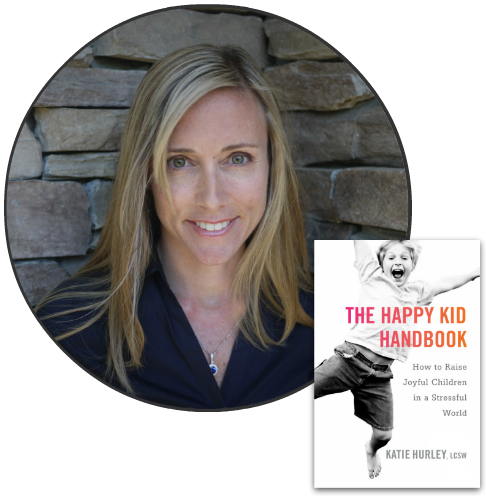 Katie, the brains behind www.PracticalKatie.com, is an author, speaker, and psychotherapist who uses play therapy to help kids resolve anxiety issues and build their self-esteem. Her book, The Happy Kid Handbook: How to Raise Joyful Children in a Stressful World, has been hailed as the how-to manual for raising happy kids while keeping parents sane! In it, she provides parents with strategies for connecting with their children and techniques for helping children be more assertive.
Katie, the brains behind www.PracticalKatie.com, is an author, speaker, and psychotherapist who uses play therapy to help kids resolve anxiety issues and build their self-esteem. Her book, The Happy Kid Handbook: How to Raise Joyful Children in a Stressful World, has been hailed as the how-to manual for raising happy kids while keeping parents sane! In it, she provides parents with strategies for connecting with their children and techniques for helping children be more assertive.
How important is it to be able to assert your wants and needs? Katie tell us all about it:
“When kids lack assertiveness, often they’re hyper-focusing on fear of criticism or rejection or not fitting in. Those kinds of things. Or even if they’re not able to assert their needs to their parents, they’re sort of worried about how their voices will be perceived and so they kind of quiet themselves down. But what we find is that when kids do find their voices and when they are more assertive they’re more self-confident, they’re able to stand up to peer pressure, they’re more successful academically, they’re more successful socially. So there’s just this whole wealth of good things that happen when kids learn how to assert themselves appropriately. And when you’re feeling all those good things it’s hard not to be happy.”
#6 How Listening Can Solve Most Problems
Wouldn’t we all love a magic wand that can solve our and our children’s problems when we wave it and say the magic words? I know I would. The next best thing, I’ve found, is listening! Tosha Schore’s goes into depth and detail about the magic of listening in her talk Staylistening: One Simple Tool to Handle Tantrums, Emotional Meltdowns and More.
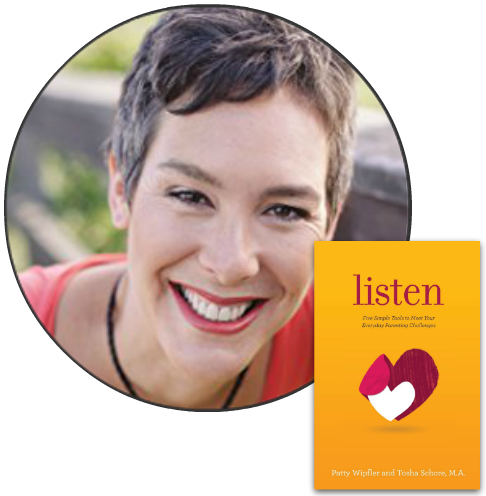 Tosha went from being an overwhelmed, stressed-out mom to a sought after parenting coach, author, and blogger for HuffPost Parents. Her website, www.ToshaSchore.com, and book Listen: Five Simple Tools to Meet Your Everyday Parenting Challenges is a resource for anyone trying to connect to with their child on a whole new level. Being a mom to 3 boys herself, she is specially equipped to help others with the challenges of parenting boys.
Tosha went from being an overwhelmed, stressed-out mom to a sought after parenting coach, author, and blogger for HuffPost Parents. Her website, www.ToshaSchore.com, and book Listen: Five Simple Tools to Meet Your Everyday Parenting Challenges is a resource for anyone trying to connect to with their child on a whole new level. Being a mom to 3 boys herself, she is specially equipped to help others with the challenges of parenting boys.
Here’s why Tosha believes listening is the most important skill a parent can have:
“When you can [listen], then the upset goes away and it doesn’t get stored. I like to think of it kind of like sedimentary rock. You see the rock kind of on the ocean side, right? And there are just layers and layers and layers and layers. So, if we’re not able to release our feelings to let them out over our lifetime… then these layers build up and at some point, they start cracking and seeping and crumbling and all sorts of behaviors we don’t really like start happening.”
#7 Helping Kids Deal With Bullying
Bullying is in my top 5 fears for my kids. No one wants his or her child to be bullied and we certainly don’t want our child to be the bully. Dr. Eileen Kenney-Moore’s talk How to Deal with Bullying (Whether Your Child is Bullied or Is the Bully) is one of the first interviews I’ve seen that takes both sides into account.
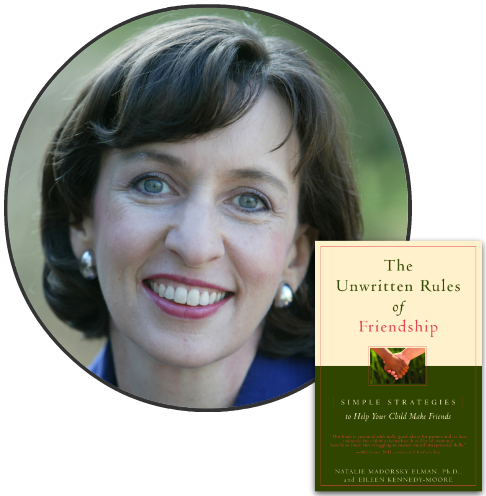 Dr. Eileen is an expert on child-&-child and parent-&-child relationships. Besides being a clinical psychologist and author of the amazing book Growing Friendships: A Kid’s Guide to Making and Keeping Friends, she is also on the advisory board to PARENTS magazine and has been featured on The TODAY Show. She continually connects with parents via her website, www.EileenKennedyMoore.com and with children via her website www.DrFriendtastic.com. All this and she’s a mom to 4 children of her own!
Dr. Eileen is an expert on child-&-child and parent-&-child relationships. Besides being a clinical psychologist and author of the amazing book Growing Friendships: A Kid’s Guide to Making and Keeping Friends, she is also on the advisory board to PARENTS magazine and has been featured on The TODAY Show. She continually connects with parents via her website, www.EileenKennedyMoore.com and with children via her website www.DrFriendtastic.com. All this and she’s a mom to 4 children of her own!
Dr. Eileen is loaded with amazing strategies for families suffering from the effects of bullying – both for the victim and the bully! Here are some of her words of wisdom:
“For all children we really need to be emphasizing creating a Culture of Kindness. The best solution for bullying is actually to marshal the other kids, the observers, who are not involved in the bullying. And to create a climate where everybody needs to be treated with respect.”
“We also have to help them [the bullies] find ways to make amends. If they did something rotten what can they do to make the other person feel better? We can help them also to harness their wish to be leaders and move it in a healthier direction. Can they be the ones to stand up for kids who are being victimized? Can they be the ones to include the kids who are on the sidelines?”
#8 Managing Anxiety
Every child worries. Every child has some level of anxiety. And every parent struggles with how to help. I know I do. Especially at night when the doubt and worry monsters start to creep in and settle in under the bed. Thank goodness for Janine Halloran’s talk about 5 Simple Coping Skills to Help Anxious Kids Calm Down!
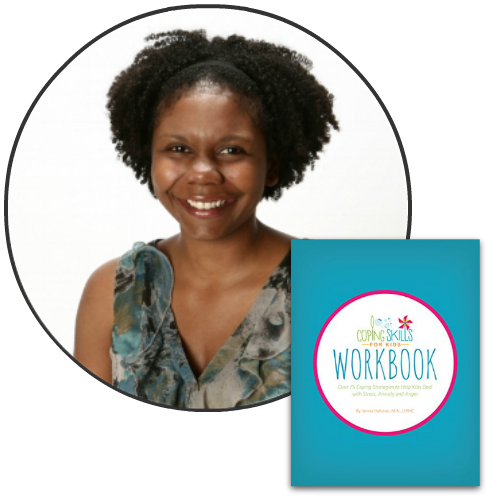 For the last 15 years, Janine has been a sought-after child and adolescent counselor in Massachusetts. She specializes in giving kids the anxiety coping skills necessary to help them to grow into resilient adults. Her website, www.CopingSkillsforKids.com, is chock-full of downloadable resources for kids, like worksheets and breathing exercise tools. And if that isn’t gold mine enough for you she also has an incredible book Coping Skills for Kids Workbook along with video courses for parents and other counseling professionals.
For the last 15 years, Janine has been a sought-after child and adolescent counselor in Massachusetts. She specializes in giving kids the anxiety coping skills necessary to help them to grow into resilient adults. Her website, www.CopingSkillsforKids.com, is chock-full of downloadable resources for kids, like worksheets and breathing exercise tools. And if that isn’t gold mine enough for you she also has an incredible book Coping Skills for Kids Workbook along with video courses for parents and other counseling professionals.
Here are some words of wisdom from Janine about anxiety and our kids:
“[Anxiety is] the most common mental health concern in children and teens.”
“Small amounts of stress can actually be helpful. Think about when you are on a deadline for something… It can be really helpful for some people, but then when that starts to turn over and it’s almost like you are a deer caught in headlights and then it’s harder for you to be able to get your work done, focus in class, socialize with other people. That’s when it really becomes sort of detrimental.”
“It’s such a cliché’ to say ‘take a deep breath’… but it is actually physiologically important to take a deep breath. It impacts you.”
#9 Communicating With Respect (Even When You are Ready to Explode)
As I mentioned in a previous article rounding up the “perspective shifter” talks, I am a reforming yeller. So I am always on the look out for anything that will help me keep my cool with my kids. Tracy Cutchlow gave me some great techniques in her talk Say What You See: A Simple Script for Calm Communication When You are Ready to Explode.
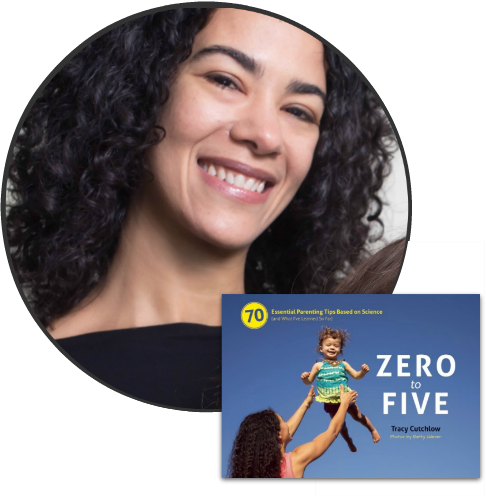 Tracy has been writing articles on parenting for the Washington Post and Huffington Post and editing books about brain development for the past several years. She gives talks across the country about how to foster a growth mindset in children and coaches parents through brain-boosting activities to do with infants. If you can’t make it to one of her talks, Tracy’s book Zero to Five: 70 Essential Parenting Tips Based on Science is an inviting book packed with easy-to-use parenting tips. Her website, www.ZerotoFive.net, is loaded with solutions – from how to include your toddler in daily household chores to how to use a prepared script to keep from flipping your lid.
Tracy has been writing articles on parenting for the Washington Post and Huffington Post and editing books about brain development for the past several years. She gives talks across the country about how to foster a growth mindset in children and coaches parents through brain-boosting activities to do with infants. If you can’t make it to one of her talks, Tracy’s book Zero to Five: 70 Essential Parenting Tips Based on Science is an inviting book packed with easy-to-use parenting tips. Her website, www.ZerotoFive.net, is loaded with solutions – from how to include your toddler in daily household chores to how to use a prepared script to keep from flipping your lid.
Here’s what Tracy has to say about the importance of having a prepared script for when you’ve just had it and are about to snap:
“Why can’t we just act the way we intend to all the time? Because we know how we intend to act, right? Patient, loving, kind, and calm, but then we’re not. Our kid does something that really just triggers us and we kind of flip out.”
“The reason that it [the “Say What You See” script] works is because… it is keeping you in the present moment. A lot of the triggers and perceptions are really about a fear we have that has to do with the past… But there’s nothing scary in the present moment.”
#10 Dropping “Good Job” from Our Vocabulary
I wrote my own article about how “Good Job” is such a pointless phrase so I was really excited to see what Jennifer Lehr had to share in her talk How to Offer Positive Encouragement (Sorry, “Good Job!” Doesn’t Cut It).
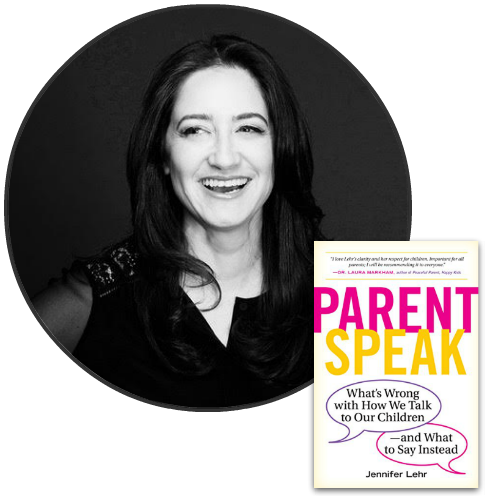 Jennifer is the dynamic mind behind PARENTSPEAK: What’s Wrong with How We Talk to our Children and What to Say Instead. Jennifer is one of those rare people who really observed and listened to how parents were talking to their children. Phrases like “good job,” “can you say thank you,” and “what’s the magic word” are things we would never say to another adult! Why would we say them to our child? She is a popular child advocate and speaks to parents from all over the country. She also writes on her website, www.JenniferLehr.com about the disconnect between these, and other, phrases and the impact they make.
Jennifer is the dynamic mind behind PARENTSPEAK: What’s Wrong with How We Talk to our Children and What to Say Instead. Jennifer is one of those rare people who really observed and listened to how parents were talking to their children. Phrases like “good job,” “can you say thank you,” and “what’s the magic word” are things we would never say to another adult! Why would we say them to our child? She is a popular child advocate and speaks to parents from all over the country. She also writes on her website, www.JenniferLehr.com about the disconnect between these, and other, phrases and the impact they make.
Here are a few of Jennifer’s insights on why saying “good job” isn’t so great:
“[Good job] is the signature phrase of the modern American parent.”
“When we say “good job,” it’s so much about our own agenda and I would encourage parents to get out of the way!… What children want is to be prized, not praised. And, really, prizing a child is letting them know they’re unconditionally loved. We love them for who they are!”
So, there you have it. 10 simple yet amazing tools that will make you a better parent. Each of these talks is a “deep dive” session in the FREE online Positive Parenting Conference. So be sure to reserve your spot today and catch as many of these talks as you can!


What I in fact think most in regard to is wellbeing themes.
By myself, I sign up for mags oriented toward this subject, and I maintain educated about the most recent health
research. Just how is this of any use? I feel there is no more important concentration for
my energy. Similarly, this blog page entry seems as if it’s well worth the time to
check out again. I dig through thousands and thousands or more
of personal blogs weekly. Honestly, my spine often is uncomfortable and I need a new diversion. lol Anyhow, I think if
almost everyone had written about their niche in life, and did so cogently, we’d have a
more cool Cyberspace. http://kids-spa-party-nj.njmassage.info/Gallery/Spa-Party-Riley-April-2016/Gallery-I-Thumbs-4HD/